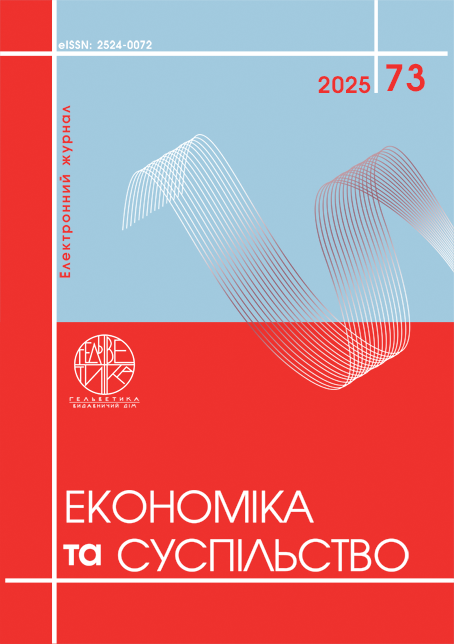CHARACTERISTICS OF REGULATORY SYSTEMS IN E-COMMERCE AS AN OBJECT OF MODELING
Abstract
In today’s globalized environment, e-commerce is actively transforming traditional business models, offering new opportunities for consumers and companies through accessibility, speed, and broad market coverage. However, alongside the expansion of digital trading platforms, the regulatory environment is becoming increasingly complex. It must not only ensure the effective functioning of online markets but also guarantee a high level of security, transparency, and the protection of all participants’ rights. Given the rapid development of digital technologies, a key issue arises: whether current regulatory systems are capable of adapting in a timely manner to new challenges, ensuring effective coordination between public authorities, businesses, and consumers, and adequately responding to cybersecurity threats and modern ethical concerns. Based on the discussion of various aspects of regulatory systems in e-commerce, it can be reasonably argued that these systems represent complex, multi-level structures that include interconnected states, properties, and functions. These components are not only closely related but also interdependent, forming dynamic systems capable of adapting to external changes and challenges while maintaining stability, security, and efficiency in e-commerce. It is substantiated that the properties of adaptability, interconnectedness, self-organization, robustness, resilience, and integration play a crucial role in enabling regulatory systems to self-improve and innovate, as well as in maintaining user trust and satisfaction. It is proven that the functions of regulation and compliance, monitoring and control, innovation facilitation, data security, conflict resolution and complaint management, and market stability are closely linked to the properties and states of the systems, supporting their adaptation and development in response to the challenges of the modern digital world. Overall, these complex interactions between system states, properties, and functions form the basis for understanding and further developing effective management strategies in the field of e-commerce.
References
Zhu, B., & Ahamat, H. (2023). The Role of E-commerce Adoption in Enhancing Regulatory Compliance in Information Systems of Foreign Investment Management in Malaysia - A Moderating Effect of Innovation Management. Journal of Information Systems Engineering and Management, 8(3), 21797. https://doi.org/10.55267/iadt.07.13611 .
Akour, I., Alnazzawi, N., Alshurideh, M., Almaiah, M. A., Al Kurdi, B., Alfaisal, R. M., & Salloum, S. (2022). A Conceptual Model for Investigating the Effect of Privacy Concerns on E-Commerce Adoption: A Study on United Arab Emirates Consumers. Electronics, 11(22), 3648. https://doi.org/10.3390/ELECTRONICS11223648 .
Al-Adwan, A. S., Al-Debei, M. M., & Dwivedi, Y. K. (2022). E-commerce in high uncertainty avoidance cultures: The driving forces of repurchase and word-of-mouth intentions. Technology in Society, 71, 102083. https://doi.org/10.1016/j.techsoc.2022.102083.
AlGhanboosi, B., Ali, S., & Tarhini, A. (2023). Examining the effect of regulatory factors on avoiding online blackmail threats on social media: A structural equation modeling approach. Computers in Human Behavior, 144, 107702. https://doi.org/10.1016/j.chb.2023.107702 .
Argilés-Bosch, J. M., Ravenda, D., & Garcia-Blandón, J. (2021). E-commerce and labour tax avoidance. Critical Perspectives on Accounting, 81, 102202. https://doi.org/10.1016/j.cpa.2020.102202 .
Dove, E. S. (2018). The EU General Data Protection Regulation: Implications for International Scientific Research in the Digital Era. The Journal of Law, Medicine & Ethics, 46(4), 1013-1030. https://doi.org/10.1177/1073110518822003 .
Hulitt, E., Vaughn, R.B. (2010). Information system security compliance to FISMA standard: a quantitative measure. Telecommun Syst, 45, 139–152. https://doi.org/10.1007/s11235-009-9248-8 .
Michael Keen, Sajal Lahiri, (1998). The comparison between destination and origin principles under imperfect competition. Journal of International Economics, Vol. 45, Iss. 2, P. 323-350. https://doi.org/10.1016/S0022-1996(98)00005-1 .
Zhu, B., & Ahamat, H. (2023). The Role of E-commerce Adoption in Enhancing Regulatory Compliance in Information Systems of Foreign Investment Management in Malaysia - A Moderating Effect of Innovation Management. Journal of Information Systems Engineering and Management, 8(3), 21797. https://doi.org/10.55267/iadt.07.13611 .
Akour, I., Alnazzawi, N., Alshurideh, M., Almaiah, M. A., Al Kurdi, B., Alfaisal, R. M., & Salloum, S. (2022). A Conceptual Model for Investigating the Effect of Privacy Concerns on E-Commerce Adoption: A Study on United Arab Emirates Consumers. Electronics, 11(22), 3648. https://doi.org/10.3390/ELECTRONICS11223648 .
Al-Adwan, A. S., Al-Debei, M. M., & Dwivedi, Y. K. (2022). E-commerce in high uncertainty avoidance cultures: The driving forces of repurchase and word-of-mouth intentions. Technology in Society, 71, 102083. https://doi.org/10.1016/j.techsoc.2022.102083.
AlGhanboosi, B., Ali, S., & Tarhini, A. (2023). Examining the effect of regulatory factors on avoiding online blackmail threats on social media: A structural equation modeling approach. Computers in Human Behavior, 144, 107702. https://doi.org/10.1016/j.chb.2023.107702 .
Argilés-Bosch, J. M., Ravenda, D., & Garcia-Blandón, J. (2021). E-commerce and labour tax avoidance. Critical Perspectives on Accounting, 81, 102202. https://doi.org/10.1016/j.cpa.2020.102202 .
Dove, E. S. (2018). The EU General Data Protection Regulation: Implications for International Scientific Research in the Digital Era. The Journal of Law, Medicine & Ethics, 46(4), 1013-1030. https://doi.org/10.1177/1073110518822003 .
Hulitt, E., Vaughn, R.B. (2010). Information system security compliance to FISMA standard: a quantitative measure. Telecommun Syst, 45, 139–152. https://doi.org/10.1007/s11235-009-9248-8 .
Michael Keen, Sajal Lahiri, (1998). The comparison between destination and origin principles under imperfect competition. Journal of International Economics, Vol. 45, Iss. 2, P. 323-350. https://doi.org/10.1016/S0022-1996(98)00005-1 .

This work is licensed under a Creative Commons Attribution 4.0 International License.


